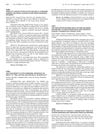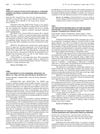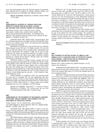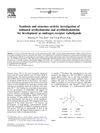 146 citations,
January 2004 in “Hormones”
146 citations,
January 2004 in “Hormones” Human skin acts like a hormone-producing organ, making and managing various hormones important for skin and hair health.
 1 citations,
January 2020 in “International journal of research in pharmacy and chemistry”
1 citations,
January 2020 in “International journal of research in pharmacy and chemistry” Eclipta alba has many health benefits and potential for medical and nutritional use.
224 citations,
February 2013 in “The Journal of clinical investigation/The journal of clinical investigation” ERG increases SOX9, promoting prostate cancer growth and invasion.
29 citations,
March 2010 in “Cancer epidemiology” Men who start losing hair at age 30 may have a lower risk of prostate cancer.
 9 citations,
July 2018 in “Medicine”
9 citations,
July 2018 in “Medicine” Men with vertex baldness may have a higher risk of developing prostate cancer, but more research is needed to confirm this.
 3 citations,
December 2016 in “Canadian Urological Association journal”
3 citations,
December 2016 in “Canadian Urological Association journal” Men with more advanced male pattern baldness have a higher risk of prostate cancer and more severe disease.
 January 2018 in “Figshare”
January 2018 in “Figshare” There might be a link between male pattern baldness and a higher risk of prostate cancer and testicular cancer.
 April 2012 in “The Journal of Urology”
April 2012 in “The Journal of Urology” Male pattern baldness may predict prostate cancer risk.
 April 2012 in “The Journal of Urology”
April 2012 in “The Journal of Urology” Patients with metabolic syndrome had lower Gleason scores when diagnosed with prostate cancer.
 March 2011 in “European Urology Supplements”
March 2011 in “European Urology Supplements” Blood tests for tumor cells could improve prostate cancer diagnosis and treatment; hair loss severity linked to a gene affecting prostate conditions.
 9 citations,
November 2018 in “Acta Clinica Belgica”
9 citations,
November 2018 in “Acta Clinica Belgica” Don't combine abiraterone and spironolactone for prostate cancer treatment as it may worsen the disease.
 6 citations,
January 2010 in “Neoplasma”
6 citations,
January 2010 in “Neoplasma” Certain gene patterns in breast cancer are linked to how active hormone receptors are and could affect patient survival.
 April 2012 in “The Journal of Urology”
April 2012 in “The Journal of Urology” Different prostate cancer treatments have similar risks of secondary cancers and related mortality when considering patient age and smoking history.
 April 2012 in “The Journal of Urology”
April 2012 in “The Journal of Urology” More prostate biopsies increase the chance of finding cancers that may not need treatment.

Finasteride's effects on prostate cancer are not clear from this text.
 June 2011 in “Oncology times”
June 2011 in “Oncology times” New treatments are making advanced prostate cancer management more complex but also more hopeful.
 September 2010 in “European Urology Supplements”
September 2010 in “European Urology Supplements” Serum triglyceride levels are not linked to prostate cancer risk.
6 citations,
June 2016 in “Journal of receptor and signal transduction research” Minoxidil increases calcium levels and kills prostate cancer cells independently of calcium.
 March 2009 in “The Journal of Urology”
March 2009 in “The Journal of Urology” Low dose finasteride causes only minor changes in PSA levels in men over 50 with BPH.
 43 citations,
December 2020 in “PLOS Genetics”
43 citations,
December 2020 in “PLOS Genetics” New method finds genetic links between Type 2 Diabetes and Prostate Cancer not seen before.
 September 2009 in “European Urology Supplements”
September 2009 in “European Urology Supplements” IGRT resulted in lower acute toxicity for stage III prostate cancer patients.
 September 2009 in “European Urology Supplements”
September 2009 in “European Urology Supplements” Cone beam computed tomography can allow for smaller safety margins around the target area in prostate cancer radiation treatment if used for ongoing treatment checks.
 71 citations,
April 2020 in “Journal of Cosmetic Dermatology”
71 citations,
April 2020 in “Journal of Cosmetic Dermatology” Genetic differences may affect COVID-19 deaths; anti-androgens could be potential treatment.
 7 citations,
October 2017 in “Urologic Oncology: Seminars and Original Investigations”
7 citations,
October 2017 in “Urologic Oncology: Seminars and Original Investigations” Men with male pattern baldness have a higher risk of aggressive prostate cancer and benign prostatic hyperplasia.
August 2017 in “Revista de la Facultad de Ciencias Médicas (Quito)/Revista de la Facultad de Ciencias Médicas” Early-onset male baldness may indicate a higher risk of prostate cancer.
 54 citations,
November 2001 in “Urology”
54 citations,
November 2001 in “Urology” The length of the CAG repeat in the androgen receptor gene affects the risk and progression of prostate cancer, BPH, infertility, and undermasculinized genitalia.
 16 citations,
September 1964 in “The journal of investigative dermatology/Journal of investigative dermatology”
16 citations,
September 1964 in “The journal of investigative dermatology/Journal of investigative dermatology” New compounds can block testosterone effects in rats and might help treat conditions like prostate cancer and acne.
 6 citations,
November 2004 in “Bioorganic & Medicinal Chemistry Letters”
6 citations,
November 2004 in “Bioorganic & Medicinal Chemistry Letters” Scientists created iodinated arylhydantoins and arylthiohydantoins that could potentially be used for imaging prostate cancer. Some versions with specific side-chains showed high potential for this use.

Higher free testosterone levels can increase bone density and decrease body fat but may raise the risk of prostate cancer, hair loss, and benign prostate enlargement.
 June 2010 in “Journal of Chemical Crystallography”
June 2010 in “Journal of Chemical Crystallography” The compound was successfully made and shows potential for treating prostate cancer.


























